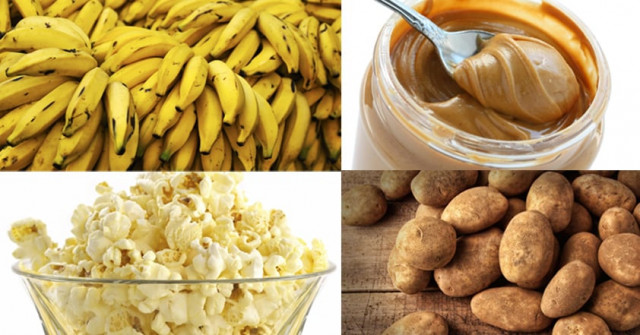6 badnaam foods which are actually good for you
Most carbs are known to speed up metabolism and control blood sugar.

Read: 5 ways to outsmart your unhealthy cravings
But before you can tell khalajaan that you don’t eat carbs, read this: carbs (essentially called carbohydrates) include starch (bread, pasta, rice, etc), fruits, non-starchy vegetables, milk and sweets. So technically you’re saying no to almost everything. According to Food Network, Health and Eating Well, carb intake curbs your hunger by filling you up, this is why you feel like your meal was incomplete without them. But besides the obvious, carbs are known to speed up metabolism and control blood sugar because some of them contain resistant starch (a unique kind of fiber) which is beneficial to your body in numerous ways.
Here’s a list of six foods which should be removed from the Wall of Shame and for good reason:
1. Potatoes (Sweet & White)
 PHOTO: KITCHEN DAILY
PHOTO: KITCHEN DAILYAlthough sweet potatoes are known as the healthier option to their white counterpart, they are hugely neglected in our part of the world. Health Cleveland Clinic states, “sweet potatoes provide 400% of your daily requirement of vitamin A.” They also pack a good amount of vitamin D & C along with magnesium and iron. These nutrient-loaded potatoes are a little leaner in shape than white potatoes and come in a variety of colours.
White potatoes, on the contrary, get a bad rep for no reason, “White potatoes are actually very good for you,” says Christian Henderson, RD, a New York City-based nutritionist. “They're a great source of potassium and vitamin C, and they have almost 4 grams of fiber with the skin on—15% of your recommended daily allowance." It also contains three times less the amount of sugar (2 grams) compared to sweet potatoes (7 grams) and more protein (3 grams) than the sweet alternative (2 grams). Having said that, there’s not need to gorge on a bucket of fries and think that you’re being generous to your body. Boiled/ baked potatoes in olive oil are you best option to work with these foods.
2. Cheese
 PHOTO: HER WORLD PLUS
PHOTO: HER WORLD PLUSIsn’t it surprising that three of the world’s biggest cheese-consuming countries – France, Italy and Greece – have some of the lowest rates of obesity and cardiovascular disease in the Western world? But let’s be real here, these countries consume real, natural cheese, not the processed and packaged cheese which comes wrapped in plastic, so don’t be mistaken.
If you’re cutting down on meat, cheese is your best alternative because it contains the right amount of amino acids your body can absorb.
And don’t be fettered by the high fat content, it’s natural and the recommended fat that your body requires. The lactose in the cheese is healthy sugar that should be included in your daily diet. According to Woman’s Day, Nourit Houminer, RD, a New York City–based nutrition consultant, suggests eating cheese with one meal a day, whether it's sprinkled on a salad, sliced and layered on a sandwich or cut right from the block.
Read: 7 foods to cure the blues
3. Peanut Butter
 PHOTO: PEANUT BUTTER FINGERS
PHOTO: PEANUT BUTTER FINGERSNo, this does not warrant 2 jars of Jiff in your grocery bag. Although this food item is loaded with calories and fat, however it contains hunger-satisfying protein, one spoon of which should suffice for a craving and fat which is entirely healthy. Eating Well claims that, “peanut butter provides protein and folate, a B vitamin important for the healthy development of new cells.” However, keep in mind that this is not the processed peanut butter loaded with hydrogenated fats and stripped of all nutrients, we’re talking about the natural peanut butter made from raw peanuts.
While you can use peanut butter as a dip with healthy fruits, you can also lather it on whole wheat bread and drizzle it with honey on top. You can make the extra effort and make your own peanut butter at home by using a blender and adding some salt, oil and a little bit of sweetener to the peanut blend.
4. Bananas
 PHOTO: HUFFINGTON POST
PHOTO: HUFFINGTON POSTOne of the natural sweeteners in food, bananas have been shunned for their high calories and sugar content. Little do you know that bananas aid digestion since they contain high amounts of fiber which assist in normalizing bowel mobility, furthermore, Food Matters states, “Eating bananas helps prevent kidney cancer, protects the eyes against macular degeneration and builds strong bones by increasing calcium absorption.” It is also a good source of vitamin B6, manganese, potassium, and fiber.
Whenever you need to rush to work just grab two bananas and a glass of milk, the nutrients in the bananas are enough to power you till lunch, they are packed with energy for one whole meal.
Read: 7 unusual uses for foods
5. Popcorn

PHOTO: SIMPLY RECIPES
YES! You can finally eat these suckers without the guilt trip. However, be warned, by popcorn we do not mean the popcorn at Neuplex or Atrium, steer clear of commercial popcorn which come in packets or are at cinemas. This is the healthy wholegrain popcorn made the old fashioned way: on a stovetop or with a popcorn maker, dry popped in hot air with no oils, fats or sugars added to it.
A study conducted by Scranton University states, “A single portion of popcorn contains more antioxidants than all the fruit and veg most people eat in a day.” Whole grain kernels, not the microwaveable variety. Would you believe that popcorn contains more iron than eggs and spinach? Plus, it’s a light snack for all weight watchers, one cup of air popped popcorn contains only 31 calories. You can munch away while watching a movie with friends and load up on essential nutrients.
According to Life Hack, “Popcorn also has a large amount of vitamins; folate, niacin, riboflavin, thiamine, vitamins B, A, E, and K, as well as being a source of iron, potassium, zinc, and polyphenols which contain the antioxidants to fight off cancers and cardiovascular health problems.” Do you really need more reasons to be convinced?
6. Nuts

PHOTO: FIESTA FARMS
They’re full of fats! But heart-healthy and good fats that are required by your body. Try not to go overboard though, when consumed in excess, these crunchy goods can lead you towards weight gain. However, nutritionists consider nuts to be a “superfood” because they reduce LDL (bad) cholesterol and are packed with various vitamins like B, E, iron, zinc and selenium.
Make a trail mix and take it to work or school, an easy way to incorporate healthy nutrients in the day. “Pistachios are rich in lutein and zeaxanthin, antioxidants that help keep eyes healthy.
Almonds provide vitamin E and walnuts offer significant amounts of heart-healthy omega-3 fats,” claims Eating Well.
Read: Stop feeding your kids these 4 toxic foods
Always keep in mind that moderation is key, if you are eliminating white carbohydrates from your diet and only eating protein, it can also have an adverse effect on your body. “The Recommended Dietary Allowance (RDA) of protein is 0.8 gram per kilogram of bodyweight per day. That translates to roughly 0.4 gram of protein per pound of bodyweight for men and women ages 19—70,” as stated by Muscle and Fitness. So try and balance your food intake and always make portion sizes so that you do not overeat.



















COMMENTS
Comments are moderated and generally will be posted if they are on-topic and not abusive.
For more information, please see our Comments FAQ